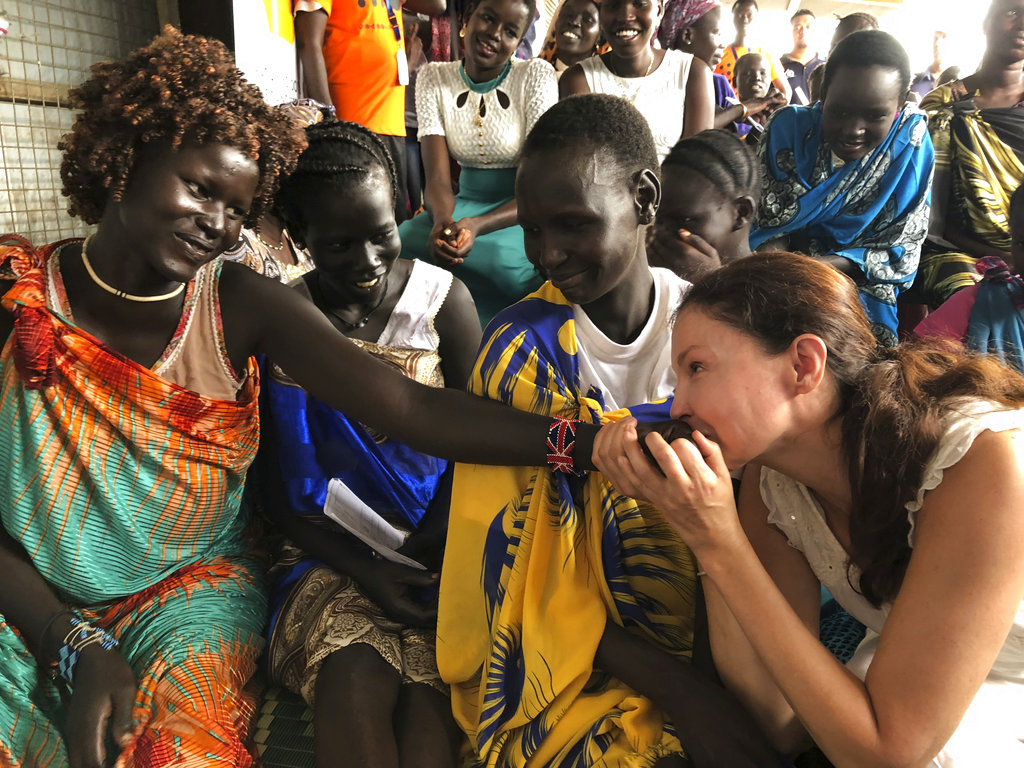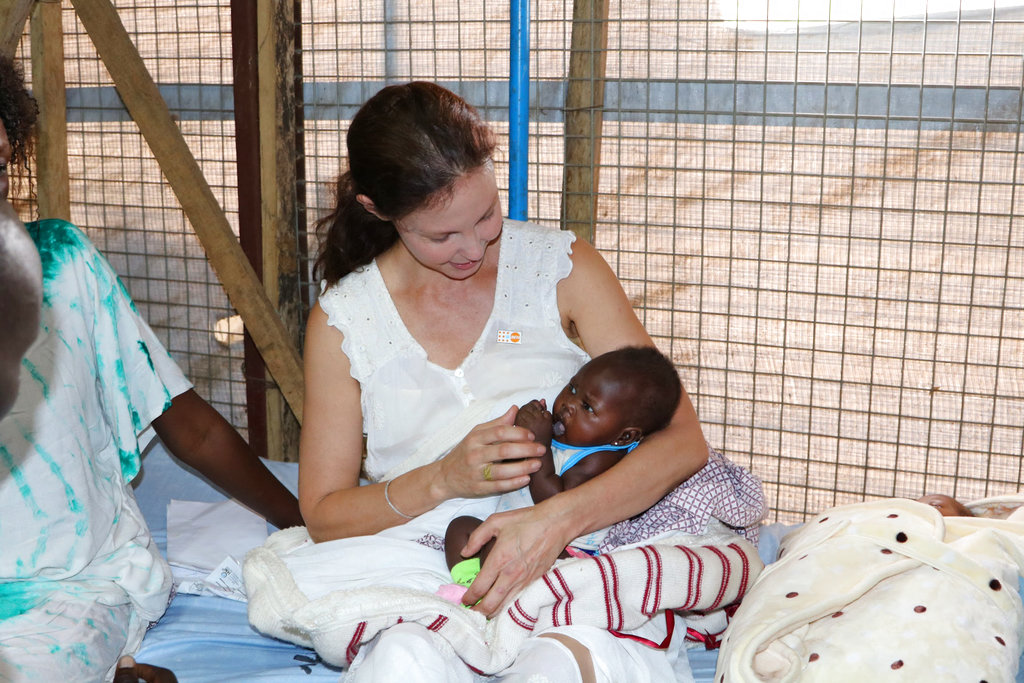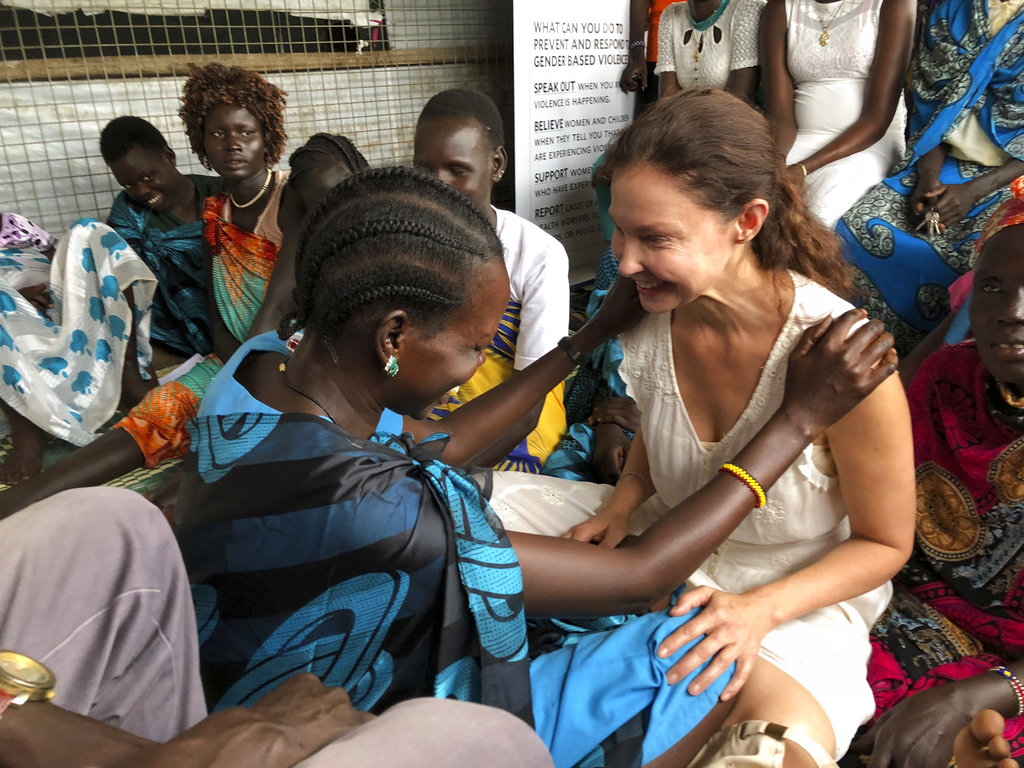Ashley Judd brings spirit of #MeToo to South Sudan

Actress Ashley Judd meets refugees in Juba, South Sudan, Thursday, June 28, 2018. Image: AP Photo/Sam Mednick
JUBA, South Sudan (AP) — In her first visit to civil war-torn South Sudan, actress Ashley Judd had a message for survivors of sexual assault in a country where rape is a widespread weapon. “I see you, I love you and I’m here for you,” she said in an interview with The Associated Press.
Seated on the floor and surrounded by women in a maternity hospital in a United Nations camp in the capital, Juba, the global ambassador for the U.N. Population Fund wiped tears from her eyes and told the mothers: “We’re all women and we’re all the same.”

Actress Ashley Judd holds a baby in Juba, South Sudan, Thursday, June 28, 2018. Image: AP Photo/Sam Mednick
Judd was among the first to come forward last year with allegations of sexual harassment against Hollywood mogul Harvey Weinstein. Eight months since speaking out she has become a prominent face of the #MeToo movement, helping women around the world combat sexual abuse and hold their perpetrators to account.
“The healing I’ve done has very powerfully shaped my work. It’s made me unafraid, it’s made me incredibly driven,” Judd told the AP on Thursday.
While the #MeToo movement has gained global momentum, however, many women in conflict-affected countries like South Sudan still suffer in silence. Five years of fighting have killed tens of thousands and displaced millions. This year alone, monitors of the conflict have reported the gang-rape of a young girl fetching water from a river, and the gang-rape by 17 soldiers of a woman who had tried to protect her teenage daughter from a similar assault and failed.
Article continues after this advertisementSixty-five percent of females in South Sudan experience physical or sexual abuse in their lifetime, with violence against women twice the global average, according to a study released last year by the International Rescue Committee and the Global Women’s Institute. There is no rule of law holding perpetrators accountable, said Nicole Behnam with the IRC’s violence prevention and response unit.
Article continues after this advertisementSitting with Judd on Thursday as she discussed a variety of reproductive health issues, Mary Gatwiech clasped the actress’ hands before embracing her. “We want to be free like you,” she said.
The 30-year-old South Sudanese mother told the AP that her friends who have been sexually assaulted want to “tell everyone what happened,” but most fear that it will bring shame to their families or that their husbands will leave them.

Actress Ashley Judd meets refugees in Juba, South Sudan, Thursday, June 28, 2018. Image: AP Photo/Sam Mednick
South Sudan’s government says it encourages survivors to speak out but acknowledges the widespread taboo and fear of repercussions.
“Sometimes speaking out causes more harm to the survivors because the perpetrator might be someone powerful,” said Dr. Alexander Dimiti, director general for reproductive health at South Sudan’s health ministry. The only way to bridge the gap between his country and more outspoken ones like the United States when it comes to accountability is through education, he said.
In an attempt to combat gender-based violence, the U.N. Population Fund last year launched an initiative to reduce practices like forced childhood marriage.
In addition to creating awareness South Sudan needs “men champions,” said the agency’s country representative, Mary Otieno. “(We need) men to come up and tell other men that this is wrong, this isn’t our tradition, this isn’t our culture and this is a violation of human rights and their dignity.”
South Sudan isn’t the only country that needs men to speak out, Judd said. The world will change when a perpetrator comes forward and says, “I screwed up.”
That’s not happening anywhere yet, the actress said. She told the head of the U.N. mission to South Sudan that the “impunity of men abusing women and girls must end, whether that be among citizens within South Sudan, within the U.N. system or back home in the USA.”
For now, some in Africa are reaching out to South Sudan. A new movement called #SAWASouthSudan held its first virtual summit last month in Kenya to help women be heard.
“Those who have the loudest voice in the #MeToo movement must empower those who have no voice at all and show all the women of Africa that it stands with them in their darkest moments,” said Cormac Smith, research and advocacy officer for the South Africa-based Southern African Liaison Office. NVG
RELATED STORIES:
Ashley Judd sues Harvey Weinstein saying he wrecked her career